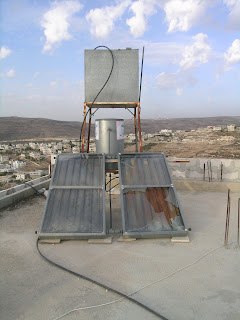The Palestinian family makes their case
to the Israeli Occupation Force.
Two
MPTers traveled to
Jit to provide accompaniment to a family who wished to harvest olives from their land, which adjoins the illegal Israeli settlement of
Qedumim. Several years ago, a large section of their land was confiscated and 20-30 olive trees destroyed, to build a radar tower and a road to the settlement. Palestinian farmers are routinely evicted from lands close to illegal Israeli settlements, a process which not only denies farmers their livelihoods, but also facilitates the annexation of additional Palestinian lands by Israeli settlers. The family told
MPT that about seven years ago the settlers had cut and poisoned their olive trees, so that 50-year-old trees are stunted and look more like 10-year-old trees.
Upon arrival at their olive grove, the family was dismayed to find there were hardly any olives on the trees. They concluded that settlers had picked them. In addition, the path among a section of the trees was strewn with the skull and bones of what must once have been a horse.
 The family told the MPTers, "You see how they [Israeli settlers] treat our land."
The family told the MPTers, "You see how they [Israeli settlers] treat our land."
It
wasn’t long before two settlers arrived on the scene, an armed young man and a woman, who demanded the IDs of the Palestinian landowner, his wife and his brother. When later asked why they would give settlers their IDs, a relative responded that they could be shot should they refuse. The
MPTers insisted that the IDs be returned to the Palestinians, that the settlers had no right to them, and after a time they were returned. The settlers began making phone calls almost as soon as they arrived, and the
MPTers called the branch of the Israeli Forces that addresses settler problems. The two settlers were soon replaced by an armed young man whom the
MPTers believed to be a member of settler security, although he wore no uniform.
A jeep of young soldiers arrived, and almost immediately took the IDs of the Palestinians. Two more soldiers arrived and, after assessing the situation, left to pick up their captain. Other soldiers left and new ones arrived. Then the major drove up. (Interestingly, as each group of soldiers arrived, they greeted and shook hands with the settlement security guard.) Amid this flurry of coming and going, the soldiers were poring over orders and maps, making phone calls, talking among themselves, talking with the Palestinian landowner, pointing and gesturing around the landscape.
 Israeli soldiers and the settler security guard pore over the map.
Israeli soldiers and the settler security guard pore over the map.
This activity lasted two and a half hours, with no relief from the hot sun. Several times an
MPTer asked the soldiers if the family could work while the discussion continued, and was told no. The story kept changing. First, the Palestinians did not have permission to pick that day. Then the land
wasn’t theirs. At one point the major approached the
MPTers and said: “Two sentences. You have to leave. The Palestinians can stay and pick.”
MPTers protested that they had been invited by the Palestinians, and that it was up to the Palestinians whether they would leave. The Palestinian landowner insisted that the
MPTers were his guests and would stay. Finally, the Israeli officers declared they needed to get better maps and would meet with the Palestinian landowner in two hours.

Life under Occupation: the Palestinian waits to learn if he can tend his own land.
The
MPTers had been very concerned about the safety of the Palestinian IDs, trying to keep track of who had them. The IDs passed hands as the soldiers came and went, and twice the IDs left the area with the soldiers who had them. When this concern was expressed to the major, he said not to worry, that the Palestinians could go back to their village and get them there. Knowing that the Palestinians could be arrested for not having their IDs with them, the
MPTers told the major they would not leave the vicinity of the settlement until the IDs were returned to the Palestinians. The IDs were returned when the meeting disbanded.
The late afternoon meeting was postponed to 9am the following morning. The family, two
MPTers, and two other internationals who had come to show support, met the military and two settlers on the family’s land. The Israeli soldier in command that day refused to allow any internationals to come anywhere near the discussion. He also banned the taking of any photographs, although several were surreptitiously taken. Again, maps were scrutinized and vigorous discussion ensued, accompanied by flailing of arms and gesticulations in various directions.
 So many people to reach no decision.
So many people to reach no decision.
After an hour it was determined that new aerial maps needed to be taken to determine what land, if any, belonged to the Palestinian family.
The family, however, was granted permission to continue picking what olives remained and to prune their trees, which they did. The
MPTers and other internationals assisted and provided accompaniment. One family member explained that the trees had not been pruned in three or more years because of trouble with settlers. He also said that because of the international presence, the soldiers remained on the scene and consequently prevented any settler disturbances. When pressed, “Are you sure we made a difference?,” the Palestinian landowner replied, “I know it.”

20-30 olive trees were uprooted to build this road and radar tower. The family was not compensated. They are not allowed to tend the trees around the tower, as that is now a "security area."

 Israeli soldiers and jeeps in front of the family's home.
Israeli soldiers and jeeps in front of the family's home.
 Solar panels on the roof, one damaged previously by settlers.
Solar panels on the roof, one damaged previously by settlers.


















































